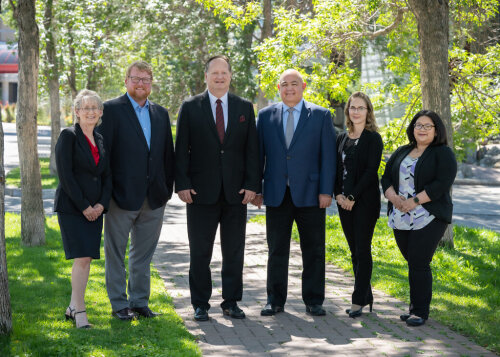Best Guardianship Lawyers in Prince George
Share your needs with us, get contacted by law firms.
Free. Takes 2 min.
List of the best lawyers in Prince George, Canada
About Guardianship Law in Prince George, Canada
Guardianship in Prince George, Canada, is a legal process appointing an individual to make decisions for another person, usually a minor or an adult who is unable to make decisions for themselves due to incapacity. This process ensures the well-being and protection of individuals who cannot care for themselves or manage their personal affairs. Guardianship serves to safeguard the person's health, well-being, and financial interests, ensuring they are supported by someone with the legal authority to act on their behalf.
Why You May Need a Lawyer
Seeking the expertise of a lawyer in Guardianship matters can be crucial for several reasons. You may need a lawyer if you are trying to appoint a guardian for a minor child, dealing with disputes in guardianship situations, or navigating the complex procedures involved in the legal system. Additionally, if there are disagreements among family members, the potential for the exploitation of the individual under guardianship, or if you're contesting a guardianship, legal counsel is often essential to protect everyone's best interests.
Local Laws Overview
The Guardianship process in Prince George is guided by laws under the province of British Columbia. Key aspects of these laws include the requirement for thorough assessments of the individual's capacity, the role and responsibilities of a guardian once appointed, and the necessity for ongoing reviews of the guardianship. The Family Law Act and Adult Guardianship Act are significant legislative frameworks defining how guardianship is managed, ensuring the individual’s rights and welfare are prioritized at every stage.
Frequently Asked Questions
What is the difference between guardianship for a child and for an adult?
Guardianship for a child typically involves decisions about their care, well-being, and education, while adult guardianship often focuses on managing personal and financial affairs for an incapacitated adult.
How is legal guardianship established?
Legal guardianship is generally established through a court order following a formal assessment of the person’s need for a guardian. It requires submitting an application to the court and demonstrating why guardianship is necessary.
Who can apply to be a guardian?
Generally, any adult with a significant relationship to the individual needing guardianship, such as family members or close friends, can apply to be a guardian.
Is a lawyer required to apply for guardianship?
While it’s not legally mandated to have a lawyer, obtaining legal advice is highly recommended to navigate the complexities of the process efficiently and to ensure all legal requirements are met.
What responsibilities do guardians have?
Guardians are responsible for making personal and/or financial decisions for the person under guardianship, which can include healthcare decisions, lifestyle choices, and managing assets or finances.
Can guardianship be terminated?
Yes, guardianship can be terminated if the guardian is no longer needed, the individual regains capacity, or if it’s in the best interest of the individual being cared for. The proper procedure involves returning to court for an order.
How long does the guardianship process take?
The duration of obtaining guardianship varies depending on the complexity of the case and any potential disputes, but it typically takes several months to finalize.
Are there different types of guardianship?
Yes, there are several types, including guardianship of the person, guardianship of the estate, or general guardianship covering both areas.
What costs are involved in applying for guardianship?
Costs can include court fees, professional assessments, and potentially legal fees if hiring a lawyer. These can vary depending on the complexity of the case.
Can a guardian be held accountable for their actions?
Guardians can be held legally accountable if they misuse their powers or fail in their duties. They may need to report to the court periodically, ensuring they act in the best interests of the person under guardianship.
Additional Resources
For additional guidance, individuals can contact organizations such as the Public Guardian and Trustee of British Columbia, the Canadian Mental Health Association, and local legal clinics specializing in family and estate law. These bodies provide valuable advice, support, and sometimes direct legal assistance for those navigating guardianship issues.
Next Steps
If you believe you need legal assistance in a guardianship matter, consider scheduling a consultation with a family law attorney who has experience in guardianship cases. Prepare all relevant documents and a summary of your situation ahead of time to facilitate your initial meeting. Reaching out to local support organizations can also provide interim guidance and help you understand your options before proceeding legally.
Lawzana helps you find the best lawyers and law firms in Prince George through a curated and pre-screened list of qualified legal professionals. Our platform offers rankings and detailed profiles of attorneys and law firms, allowing you to compare based on practice areas, including Guardianship, experience, and client feedback.
Each profile includes a description of the firm's areas of practice, client reviews, team members and partners, year of establishment, spoken languages, office locations, contact information, social media presence, and any published articles or resources. Most firms on our platform speak English and are experienced in both local and international legal matters.
Get a quote from top-rated law firms in Prince George, Canada — quickly, securely, and without unnecessary hassle.
Disclaimer:
The information provided on this page is for general informational purposes only and does not constitute legal advice. While we strive to ensure the accuracy and relevance of the content, legal information may change over time, and interpretations of the law can vary. You should always consult with a qualified legal professional for advice specific to your situation.
We disclaim all liability for actions taken or not taken based on the content of this page. If you believe any information is incorrect or outdated, please contact us, and we will review and update it where appropriate.








